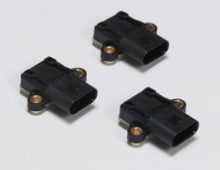Sensors are devices that provide detection and measurement of a physical stimulus and converts that measurement into an electrical output signal that can represent the level, intensity, or strength of the property. Electrical signal outputs from a sensor can be in the form of a voltage, current, resistance, capacitance, frequency, or digital data output. Sensor types include temperature, pressure, position, level, force, speed, vibration, flow, optical, and humidity.
The main functions that a sensor performs are: monitoring - the sensor provides information to a display or recording device; information provided based on a condition or changes in a phenomenon (feedback) and then controls the function to maintain parameters within a selected range; or by adding intelligence within systems that can process data to help make complex autonomous decisions in an operation.
Our sensors can provide the solution for your application requirements, including:
- Digital sensors with I2C and SPI protocols that use less power and provide excellent resolution, accuracy, and precision in IoT applications.
- Sensors with a smaller form factor, packaged to fit within miniaturized designs.
- Wireless connectivity sensors that feature LoRaWAN or Bluetooth Low Energy (BLE) communication protocols for data transfer, ideal for condition monitoring applications.
- Certified sensors for harsh and hazardous environments, where sensors may be exposed to explosive atmospheres, extreme temperatures, high vibration levels, mechanical shock, or environments with strong EMI/RFI/ESD fields or high levels of radioactivity.
- Multi-sensor modules to measure multiple parameter outputs via an I2C interface.






















